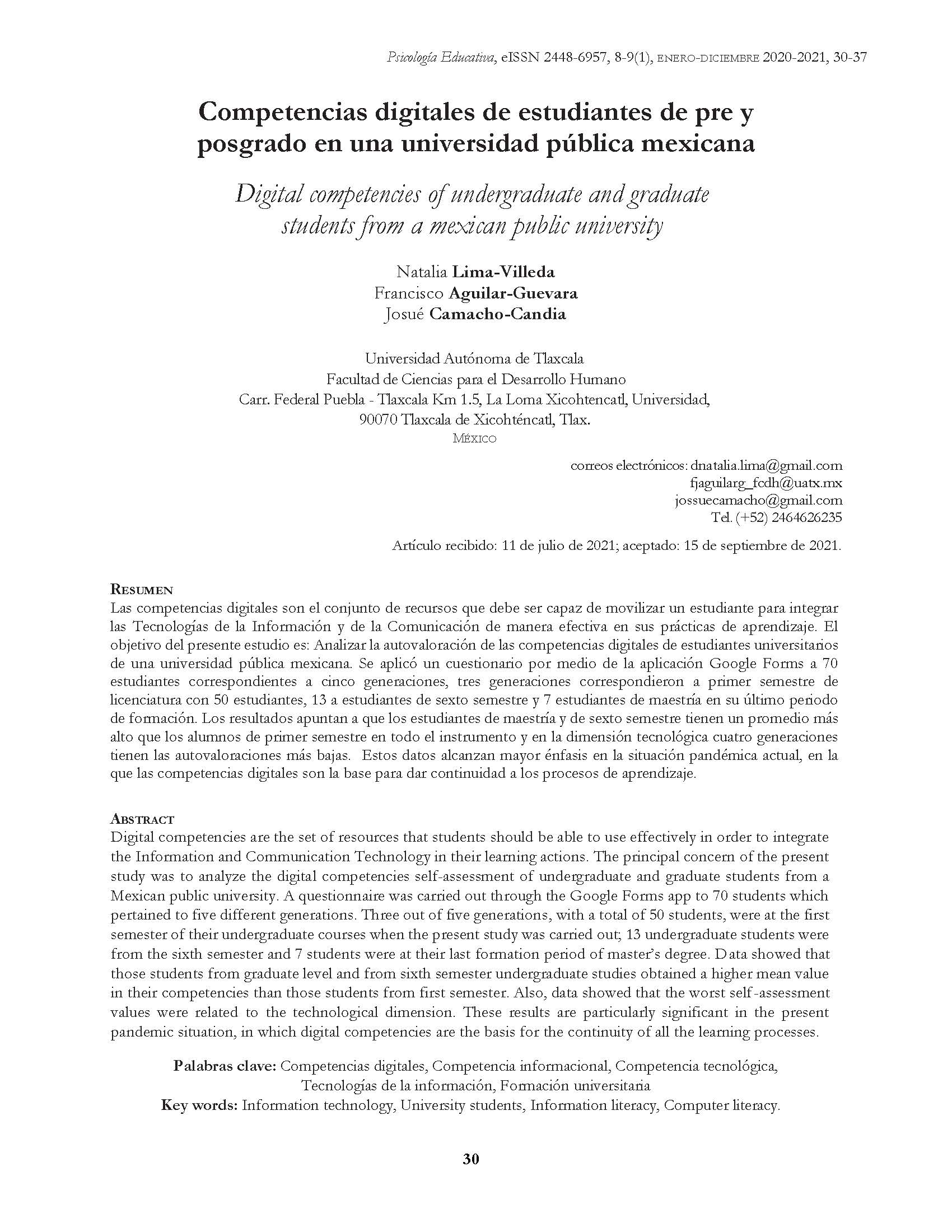Abstract
Digital competencies are the set of resources that students should be able to use effectively in order to integrate the Information and Communication Technology in their learning actions. The principal concern of the present study was to analyze the digital competencies self-assessment of undergraduate and graduate students from a Mexican public university. A questionnaire was carried out through the Google Forms app to 70 students which pertained to five different generations. Three out of five generations, with a total of 50 students, were at the first semester of their undergraduate courses when the present study was carried out; 13 undergraduate students were from the sixth semester and 7 students were at their last formation period of master’s degree. Data showed that those students from graduate level and from sixth semester undergraduate studies obtained a higher mean value in their competencies than those students from first semester. Also, data showed that the worst self-assessment values were related to the technological dimension. These results are particularly significant in the present pandemic situation, in which digital competencies are the basis for the continuity of all the learning processes.
References
Agreda, M., Hinojo, M. J. & Sola, M.J (2016). Diseño y validación de un instrumento para evaluar La competencia digital de los docentes en la Educación superior española. Píxel-Bit. Revista de Medios y Educación, 49, 39-56. doi: http://dx.doi.org/10.12795/pixelbit.2016.i49.03
Aparicio, O. Y. (2018). Las TIC como herramientas cognitivas. Revista Interamericana De Investigación, Educación Y Pedagogía, 11(1), 67-80.
Esteve, F., Castañeda, L., y Adell, J. (2018). Un Modelo Holístico de Competencia Docente para el Mundo Digital. Revista Interuniversitaria de Formación del Profesorado, 91 (32.1), 105-116. Recuperado de http://hdl.handle.net/10234/174771
Cabero Almenara, J., Barroso Osuna, J. M., & Romero Tena, R. (2015). Aprendizaje a través de un entorno personal de aprendizaje (PLE). Bordón. Revista de pedagogía, 67 (2), 63-83. DOI: 10.13042/Bordon.2015.67205
Cabero, J., & Llorente Cejudo, M. D. C. (2006). Capacidades tecnológicas de las TICs por los estudiantes. Enseñanza, 24, 159-175. http://hdl.handle.net/11441/17352
Cañete-Estigarribia, D., Torres-Gastelú, C.A., Lagunes-Domínguez, A., y Gómez-García, M., (2021). Instrumento de autopercepción de competencia digital para futuros docentes. Pädi, 9, 85-93. https://doi.org/10.29057/icbi.v9iEspecial.7488
Eshet-Alkalai, Y. (2004). Digital Literacy: A Conceptual Framework for Survival Skills in the Digital Era. J.I. of Educational Multimedia and Hypermedia, 13(1),93-106
García, B., Márquez, L., y Ávila, J.L., (2009). Planeación y desarrollo del proyecto de investigación. En B. García (coord.), Manual de métodos de investigación para las ciencias sociales. Un enfoque de enseñanza basado en proyectos (pp.1-46). México, México Distrito Federal: Manual Moderno.
Glister, P. (1997). Digital literacy. John Wiley
González-Martínez J., Esteve-MonF. M., Larraz Rada, V., Espuny Vidal, C., & Gisbert Cervera, M. (2018). INCOTIC 2.0. Una nueva herramienta para la autoevaluación de la competencia digital del alumnado universitario. Profesorado, Revista De Currículum Y Formación Del Profesorado, 22(4), 133-152. https://doi.org/10.30827/profesorado.v22i4.8401
Gutiérrez Castillo, J. J., Cabero Almenara, J., & Estrada Vidal, L. I. (2017). Diseño y validación de un instrumento de evaluación de la competencia digital del estudiante universitario. Revista Espacios, 38 (10). http://hdl.handle.net/11441/54725
Guzmán-Cedillo, Y. I., Lima-Villeda, N., y Meza, M. (2019). Capítulo 6. Rúbrica para evaluar infografías como producto de aprendizaje potencial en la argumentación. En: Guzmán-Cedillo (Coord.), Elaboración de rúbricas para promover la competencia argumentativa: experiencias docentes en educación superior (pp. 155-164). UNAM Facultad de Psicología.
Guzmán-Cedillo, Y. I., Lima-Villeda, N., y Meza, M. (2017). Diseño y confiabilidad de una rúbrica para evaluar infografías didácticas. Diseño y confiabilidad de una rúbrica para evaluar infografías didácticas, 17-36.
Guzmán-Cedillo, Y. I., Lima-Villeda, N., y Ferreira-Rosa, S. (2015). An Experience of Elaborating Didactic Infographics on Sexual Diversity‖. Revista Latina de Comunicación Social, 70, 961-981. doi: 10.4185/RLCS-2015-1080en
Kriscautzky, M., & Cabrera, I. M. (2015). TICómetro® 1: Cuestionario Diagnóstico sobre Habilidades Digitales. http://hdl.handle.net/20.500.12579/4586
Moreno, A., Fernández, M. A. y Godino, A. (2020). Competencia digital Docente: Área de información y alfabetización informacional y su influencia con la edad. ACADEMO Revista de Investigación en Ciencias Sociales y Humanidades, 7(1), 45-57. DOI: http://dx.doi.org/10.30545/academo.2020.ene-jun.5
Rangel, A. (2015). Competencias Docentes Digitales: Propuesta de Un Perfil. Píxel-Bit. Revista de Medios y Educación. 46, 235-248. doi: http://dx.doi.org/10.12795/pixelbit.2015.i46.15
Restrepo-Palacio, S., & Cifuentes, Y. D. M. S. (2020). Diseño y validación de un instrumento de evaluación de la competencia digital en Educación Superior. Ensaio: Avaliação e Políticas Públicas em Educação, 28, 932-961. https://doi.org/10.1590/S0104-40362020002801877

This work is licensed under a Creative Commons Attribution-NonCommercial-NoDerivatives 4.0 International License.
Copyright (c) 2024 Universidad Nacional Autónoma de México


